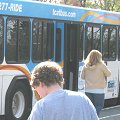- By Patty Poist
- News
 Print
Print  Tompkins Consolidated Area Transit, Inc. today expressed its strong opposition for the provisions in House bill H.R. 3864, the federal American Energy and Infrastructure Jobs Financing Act, which would eliminate dedicated federal fuels taxes for public transit and create long-term uncertainty for public transportation funding for the first time in three decades.
Tompkins Consolidated Area Transit, Inc. today expressed its strong opposition for the provisions in House bill H.R. 3864, the federal American Energy and Infrastructure Jobs Financing Act, which would eliminate dedicated federal fuels taxes for public transit and create long-term uncertainty for public transportation funding for the first time in three decades.As TCAT looks to expand capacity during record ridership of nearly 4 million annual trips, this change will have dire consequences for the thousands of people in Tompkins County who rely on public transit.
Since 1983, nearly half of all public transportation funding has been provided from the federal motor fuels tax dedicated to the Highway Trust Fund. This funding structure has successfully provided highway and transit programs with secure, dedicated revenues and has allowed public transit systems around the country to create jobs and foster economic growth.
Under the proposed change, public transit funding would receive a one-time appropriation, with no funding for public transportation after 2016. This would create deep uncertainty for TCAT.
“I strongly oppose the current provisions of H.R. 3864, which will eliminate dedicated federal fuels taxes for public transit,” said TCAT General Manager Joe Turcotte. “This change will make it very difficult for us to plan for the future, even as we are seeing more people than ever turning to public transportation to get around. Instead of creating jobs in Tompkins County and for the bus manufacturing industry in New York, we will be forced to contend each year with a deeply divided Congress.”
Federal funding accounts for about 12 percent of TCAT’s annual operating budget or nearly $1.4 million. In addition, federal funding is critical to TCAT’s capital budget and accounts for 80 percent of all bus purchases. Federal dollars are also crucial to Gadabout Transportation Services, which provides paratransit services in Tompkins County via a contract with TCAT.
Turcotte was one of 10 regional transportation industry experts who testified last March before a U.S. House Committee on Transportation & Infrastructure listening session in Cortland, N.Y. The listening session was headed by Committee Chairman U.S. Rep. John Mica, R‑Florida and hosted by committee member U.S. Rep. Richard Hanna, R‑Oneida County (who also represents a portion of Tompkins County). Turcotte told the committee that TCAT and public transit agencies across the country need a predictable and adequate stream of federal funding to meet the increasing demand in ridership. Congressmen Mica and Hanna co‑authored House Bill 3864 with their fellow committee members and recently unveiled it in Washington, D.C. Last week, the House Ways and Means Committee voted to divert motor fuels tax revenues that had been dedicated to public transportation since 1983 under President Reagan and deposit those funds into the Highway Account to support highway investment. The proposal would put public transportation in a new “Alternative Transportation Account” and would only fund the federal transit program in fiscal years 2013 through 2016.
Turcotte said he hopes TCAT passengers and TCAT stakeholders will work to convince Congressman Hanna, vice chairman of the highways and transit subcommittee, and other proponents of the legislation to change their minds.
“This legislation would be detrimental to Tompkins County and to public transit riders all across the country as it would force more service reductions and fare hikes,” Turcotte said. “TCAT is the sole source of transportation for many of our riders and it would be terrible to leave them with no way to get to work, school or where they need to go.”
Public transportation is a proven solution to many of the economic problems facing the United States. For every $1 billion invested, more than 36,000 jobs are created and supported, resulting in nearly $500 million in federal, state, and local tax revenues. For every $1 invested in public transportation, $4 is generated in economic returns, according to the American Public Transportation Association.
TCAT Board of Directors Chairperson Pam Mackesey said her biggest priority this year is to examine ways to strengthen TCAT’s budget. The dismal budget climate at federal, state and local levels has already forced TCAT– just like numerous public transit agencies across the country – to reduce service and raise fares this year.
“This year, we must redouble our efforts to make sure that this gem of a transportation system not only survives, but thrives and grows,” Mackesey said. “TCAT has developed a solid organization with excellent employees who know how to get the job done.’’
v8i6



